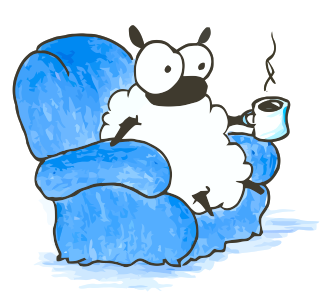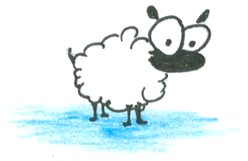The events describes herein, while not necessarily based on “facts” in the traditional, boring sense, certainly contain an emotional validity driven from the profound and inexplicable experiences of the heart…and really, isn’t that more true than anything you’ve read on Wikipedia?
A Sometimes Fictional Childhood
It was the start of another tormented school year.
I had been forced to pick a descriptive adjective starting with the first letter of my name, which I was told to write in front of my name and then colour, brightly, so it could be posted on our classroom bulletin board.
Joyce picked ‘joyful.’ Leslie picked ‘little.’ Kate picked ‘kind.’ This was a ballsy and blatant lie, but the teachers were happy to ignore Kate’s disregard for facts and civility so long as she used the right letter.
I was determined to use this project as a insightful exercise in self examination. Plus, my first name was a mere three letters long, and so I needed a suitably large descriptor if I was going to be able to use five or more pencil crayons in the colouring portion of my masterpiece. If I chose a lame word like ‘imp’…not that I would…I would find myself at the bottom of the colour spectrum, failing to beat even Loyal Lu, who didn’t speak much English. That would be disgraceful.
When I failed to think of a suitable alliterating adjective in class, I took the project home and pulled out our family’s bulky dictionary.
“Indigenous!” I cried. My mother eyed me skeptically.
“I think it’s a word that’s used for aboriginal people.” My mother said, and I asked her if I was aboriginal. She informed me that I was not, and in doing so crushed my dreams.
“Indignant!” My mother said this was accurate, but could be perceived as an attack on the project itself and the teachers who created it, which was not the sort of thing I wanted to do so early in the school year.
I sighed and closed the dictionary. My mother suggested ‘Irish.’
I stated that I was not Irish.
But my name was Irish, and my ancestors came from Ireland, she argued, or at least a few of them did.
But I wasn’t an Irish citizen, and I didn’t have an Irish passport, and real Irish people would laugh at me and call me a poser. The humiliation of this possibility did not impress my mother, who knew there were no real Irish citizens trolling the halls of my school and analysing the artwork of young children, but she let the subject go. I pondered how the colonial legacy of North America had left me unable to claim the title of Irish or Indigenous as my own. I couldn‘t even write ‘immigrant,’ because I knew I wasn‘t one of those, either. I would have been happy to write ‘Canadian’ or even ‘confused,’ but neither of those started with the letter ‘i’.
I asked my mother why she hadn’t named me Clifford.
“You could call me ‘Cliff,’ or ‘Cliffy.’” I stated, shocked by her lack of foresight.
My mother went to the other room.
I continued to brainstorm all the names that would have been easier to work with, until my brother heard of my project and ruined my fun.
“Impostor.” He yelled from the couch, watching Ninja turtles. “Impolite. Immature. Embarrassed.”
Neither of us knew that the last was not an i-word at all. I grew angrier and my face turned red.
“Inflamed. Infuriated. Injuring me!” I had only punched him once on the arm. “In trouble. Ha.”
My mother came back from the kitchen and banished me to my room, which was actually a small corner of my sister’s room. She had been playing quietly on the floor and was approximately four years old.
I asked her if she knew any ‘i’ words.
“Illiterate.” She responded. I eyed her suspiciously.
The troubles with my name had been in the works long before I was ever conceived. My great grandmother’s middle name was Anne, and my grandmother’s middle name was Anne. My mother, her firstborn daughter, had the middle name Anne. And so I was destined to have the most boring and common middle name for my own, whether I liked it or not. I didn’t.
My last name was to be Donegal; I have no issues with my last name. But the pairing of Anne and Donegal created an uncomfortable set of initials. My mother liked ‘Beatrice’ for a first name, which spelled B-A-D, ‘bad.’ My father liked Michelle, spelling M-A-D, ‘mad.’ Even ‘Hailey,’ which they both thought was pretty, seemed pejorative when they knew I would be ‘had.’ Sad, fad, lad, wad…none of these seemed especially nice labels to saddle on a tiny baby girl.
Clifford would have worked, but my parents were too conventional. My father hated names that were androgynous, having himself endured the name Shannon. My grandparents already had two boys and thus declared that their youngest child-to-be would be a Shannon, hoping a double x chromosome would take the hint and follow suite. It didn’t, and Shannon the boy had spent his entire life being mistaken for Shannon the girl.
My brother’s name, John, was chosen by him as a stance against all things ambiguously gendered.
Neither of my parents ever expressed any real enthusiasm over my name or could describe why they had picked it, specifically. It had been a compromise and a necessary task of late pregnancy, much like taking out life insurance or deciding whether or not to get an epidural.
“I liked it. I thought it was kind of pretty.” My mother claims, trodding all over my self esteem. She loves my little sister’s first name. She loves my older brother’s second name, which is her father’s first name.
I think of her describing me, her middle child, to strangers: Oh, Ivy. I like her, I guess. She’s kind of pretty.
And the story goes downhill from there.
Because ‘Ivy’ proved too hard a name to repeat incessantly, my mother and grandmother often shortened it down. This was difficult, as my name was only three letters to start with and relatively easy on the tongue. The resulting nickname was ‘Ives’ or sometimes ‘Ive.’ They were ineffectual short forms, as they took nearly as much energy to say and equal or greater energy to write, but that wasn’t my major problem.
I had several majors problems.
First on my list of grievances is the fact that ‘Ives’ sounds a lot like ‘hives,’ a skin condition of itchiness and clustered, ugly bumps that results from exposure to a triggering allergen. Much like the rash resulting from exposure to Poison Ivy, which was what my brother called me. No one likes hives, and no one likes Ives. Unfortunately, my mother did not grasp this abstract concept.
Second, no one seemed capable of figuring out what ‘Ives’ stood for, though this never stopped them from trying to guess. Having heard only ‘Ives’ from my mother, a foreign adult would then refer to me: Ivory? Ivanhoe? Yvonna? Ivan? (Note: two of those names are male. My father would be appalled.)
Ivy was difficult to guess, because regular parents do not name their offspring after climbing and poisonous plant life.
After a dental hygienist called me Ivory in front of us both, and we’d later retreated to the car, I crossed my arms and announced that I might as well just change my name.
“Ivory’s a nicer name anyways.” I groused.
My mother raised an eyebrow and wondered if I wanted to be named after the poached tusk of a dead elephant. I did not. But then again, it was unlikely that my mother would call me ‘ivory’ even if it was my real name. She would shorten it to something uglier and be impervious to my protests.
This brings me to my final point.
A person should never be called by something that they don’t want to be called, no matter how lovely a name or nickname it objectively may be. If your kid does not want to be called ‘Ives,’ a reasonable adult should quit calling her Ives. And if her only response to the name is always ‘Stop calling me that!’ and anger at your continued obstinacy, then you should certainly quit calling her Ives. And if, twenty years down the road, when she calls you on the phone, and someone else in the background asks who’s calling, and you answer back ‘it’s Ives’ and a part of me dies...Seriously, Mother. If you’re reading this, I love you, but you have got to STOP calling me Ives. For the love of baby Jesus.
Wednesday, June 17, 2009
Subscribe to:
Post Comments (Atom)





No comments:
Post a Comment